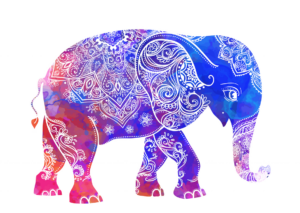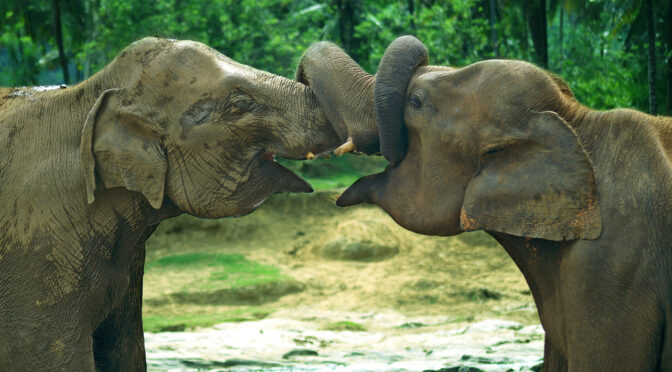The old saying goes “an elephant never forgets.” But elephants not only have incredible memories; new research has now revealed a surprising depth to the elephant psyche. Proving they are closer to humans psychologically than we ever previously thought.
Originally, the well-known phrase came about as people had observed elephants following the same trails year after year, visiting the same locations for food and water, and even re-visiting the sites where members of their herd had died. Their memories appeared very strong.
Additionally, elephants have been known to celebrate births, mourn deaths, and have even been seen aiding weaker or injured animals. Much of this behavior isn’t found elsewhere in the animal kingdom (other than in humans), so elephants are clearly very special creatures. All of this has led to a lot more research being carried out into elephants and elephant psychology.
 Latest Research into Elephant Psyches
Latest Research into Elephant Psyches
New research conducted by researchers Joshua Plotnik and Frans de Waal has now revealed that elephants are capable of experiencing and expressing empathy for one another, and surprisingly they do this in ways that almost mirror human behavior.
Plotnik combined his knowledge as a behavioral ecologist, with De Waal’s primatologist background, to conduct an in-depth study into the interaction between Asian elephants when faced with stressful situations.
They found that the elephants not only recognized when one of their herd was distressed, but that they offered various forms of support and comfort when they recognized the distress. Very few animal species had been observed consoling one another in such a way before, so this research is incredibly insightful.
The Study
Plotnik and de Waal took a sample of 26 elephants in 6 social units at the Elephant Nature Park in Chiang Mai, Thailand. 
They closely studied the behavior of the creatures when one of them became agitated expressing that agitation by pushing their ears forward, lifting their tail up, or through a variety of vocalizations such as roars, rumbles, and trumpets.
For the scientists to induce the stressful situations would be unethical and unnatural, so they simply waited it out, observing the herd for up to 3 hours a day, two weeks out of every month, over the course of a year.
The Results
The researchers noted that when one elephant became distressed (for reasons ranging from the presence of passing snakes or dogs, or even noises from other, unrelated elephants), others in the group were able to identify gestures, both physical and vocal, as cues to go to the animal and console it.
The elephants would touch their trunks to the mouth and head of the upset member – which are comforting gestures for elephants – as well as make vocal chirps of comfort. The elephants were making a conscious effort to calm and reassure the stressed member. It was very rare for there to be no reaction from the bystander elephants.
Further to this, the researchers noted “bunching” – elephants coming together to close in a circle, forming a protective layer around the individual who was stressed.

Emotional Contagion
Importantly, the researchers also observed that elephants would often match the behavior and emotional state of those under stress – something which has huge empathetic implications. They referred to this as “emotional contagion” essentially, seeing a member of their herd distressed, was distressing in itself.
In their conclusion, they noted, “The observed reactions seem similar to what is sometimes called ‘true consolation’ in nonhuman primates.” The use of the word ‘consolation’ is imperative here, and is very telling – the elephants clearly care for fellow herd members, and would do what they could to reduce any stress in the herd.
De Waal explains empathy as “a general mammalian trait”. We can see through the behavior observed in this study, that these creatures were clearly concerned for the wellbeing of their fellow herd members and actively tried to reverse it. They saw the distress, understood it from their perspective, perhaps even recounted the times they have been stressed, and moved to end it. Although these motivations are a little harder to pinpoint, it is clear that these majestic creatures can now tick off empathy on a growing list of intelligent, psychological behaviors.
Sources:
http://ed.ted.com/lessons/why-elephants-never-forget-alex-gendler
http://news.nationalgeographic.com/news/2014/02/140221-elephants-poaching-empathy-grief-extinction-science/
http://news.nationalgeographic.com/news/2014/02/140218-asian-elephants-empathy-animals-science-behavior/
https://peerj.com/articles/278/
http://www.scientificamerican.com/article/elephants-never-forget/

